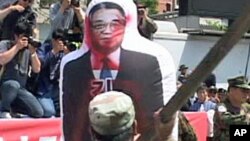Despite threatening words from North Korea after it was blamed for sinking a South Korean navy ship, many South Koreans are unconcerned. Reactions to North Korea's tough talk reveal a generation gap below the 38th parallel dividing the Korean peninsula.
Take, for example, a recent demonstration.
Protestors stand on the grass of Seoul Plaza show their support for President Lee Myung-bak and call for tough action against North Korea. But it does not take long to notice that almost everyone in the crowd is over the age of 60.
Young South Koreans have largely been absent from the public outcry over what Seoul says was a North Korean attack on the Cheonan, a South Korean navy ship, which killed 46 sailors.
Even North Korean threats of war after a team of international investigators blamed it for the attack did little to worry young adults here.
Some students at Seoul's Yonsei University, like 20-year-old Kim Nayeon, say until bombs start falling, they are not worried about North Korea at all.
"I'm not very nervous, because around me other people don't have any nervous feeling, because there are so many threats from North Korea," said Kim, adding that she has heard it all before.
Twenty-six-year-old Lee Seong-bin says the threats from both sides are more intense than before, but he is not ready to get out of town, unlike some of his friends. He says his Japanese and Americans friends here are all worried about North Korea. But South Koreans are the only ones who are not seriously concerned, said Lee.
Some older South Koreans say you had to have lived through the Korean War to understand how dangerous the current situation could become. Journalist Shim Jae-hoon was a child when North Korea invaded in 1950. There is a generation gap when it comes to perceptions of security here, he said.
"People in their twenties and thirties in South Korea today are what we call peace generation and prosperity generation, the P-generation to be short," Shim said. "These are the people who have never known what it was like fighting in the war or being poor under military rule"
The war devastated the Korean peninsula and hundreds of thousands of civilians lost their lives and homes before hostilities ended in 1953. The two sides never signed a peace treaty and over the past 60 years there have been occasional violent incidents between them.
Journalist Shim points out that when military rule ended in South Korea two decades ago, extreme anti-communist education went with it. Some analysts say it was replaced by left-leaning, nationalistic teaching that downplayed North Korean hostilities.
"Any of the young people who came of age or went to school anytime between 1998 and early 2008 will have gone through, probably have had history lessons that did more to talk about American atrocities during the Korean War than to talk about anything bad that the North Koreans might have done," says Brian Myers, Director of the International Studies Department at Dongseo University in Busan.
Myers believes that might explain why more young people come out to protest the U.S. military bases in South Korea, or American beef imports than the attack on the Cheonan warship.
Moreover, some South Koreans do not even believe that North Korea sank the ship -- up to 20 percent based on one poll here.
And that worries journalist Shim. "They have the notion that whenever we criticize the North, they think this is an extension of the past anti-communist education. So that's why they refuse to see the real picture of North Korea, they don't believe the government."
On the Internet, some South Korean skeptics say they think their government fabricated the results of the investigation into the Cheonan attack to push its hard-line policy towards the North. Other writers claim that the ship struck a U.S. mine and both nations involved in a cover up.
Threats From North Korea Reveal Generation Gap in South Korea




